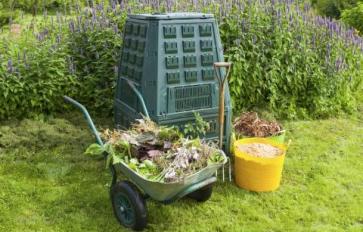
The kitchen has become more than just a space in which to prepare the next meal. Today (unlike in the past, when the kitchen was more functional than for entertaining), the kitchen is central to the home; a gathering place. And likewise, the kitchen is an expression of one’s style and values. Some folks love a sleek design, others a more country kitchen style. And, just as design and style are your choice, so is whether or not your kitchen functions sustainably. Investing in a water-saving dishwasher or energy efficient refrigerator are certainly ways to embody and express one’s awareness of environmental footprint, but there are also ways to build a sustainable kitchen beyond incorporating efficient appliances.
Developing certain habits and making a handful of small changes in how your kitchen operates can actually have far-reaching effects. Consciously making minimal efforts in your kitchen can be more sustainable for the environment, as well as for your budget, too. So, what’s your kitchen style? Streamlined sustainable with less landfill litter!
Here are 13 choices you can make and actions you can take to make your kitchen more sustainable:
RECYCLE!
This is obvious, yes, but it’s surprising to learn that the EPA estimates that 75% of the American waste stream is recyclable…yet we only recycle about 30% of it. Plastic and glass containers (for things from pasta sauce to mayo) are all recyclable, and all it takes is a quick rinse to keep these types of things from the waste stream. Generally speaking, of what is purchased, sheer plastic wrappings are what should be tossed in the trash. Recycling also keeps your trash for true trash, and in the long run, you’ll probably save on buying trash bags.
COMPOST!
For some, composting can be more challenging. Living in the city/not having your own green spaces certainly makes it more challenging, but more and more cities are adopting a curbside composting program; San Francisco, Portland, Oregon, Boulder, Seattle, and New York City are among the pioneers. Some cities also have programs that will take your compost at the local farmer’s market. If you have even a small backyard, you can definitely compost!
Bring reusable bags to the store
Keep a few reusable/canvas bags in your car for any trip to the store, grocery or otherwise. If you happen to forget your bags, opt for paper or reuse plastic bags for smaller trash bins, like those in your bedroom or bathroom.
Opt for cloth over paper towels
Paper towels are quick and easy, I agree, so if you must have them in your home, buy a roll made of recycled paper. Using cloth drying and cleaning towels is just as easy, countlessly reusable (after laundering), and means you can save the money you might spend on sponges and paper towels.
Choose wooden utensils over plastic
If you’re able, make the conscious choice to purchase utensils that are made from natural materials. Rather than purchasing more plastic utensils (spatulas, spoons, cutting boards, etc.) that eventually end up in the landfill, choose to buy more durable and longer lasting wooden or bamboo utensils for your kitchen. If not, make mindful choices about what utensils you do need that can’t be wooden, like a good silicone spatula or a strong, metal ladle.
Wash and reuse sealable plastic bags
When I was young, I was baffled by my mom’s habit of washing and reusing plastic bags over…and over…and over again. Really, though, plastic bags of good quality can actually last for up to a year, and washing, reusing, and caring for plastic storage bags means that you can save money on this expensive kitchen accessory. Or, go get yourself some Bbagz!
Reuse gently used tin foil and parchment paper
Did you cover a casserole with foil to reheat it? Bake bread on parchment paper? Recycle tin foil and parchment paper after light uses like these (where greasiness is minimal), and you can usually get one or two more uses out of something you’d otherwise toss.
Invest in Bee’s wrap
Instead of using plastic wrap – which is difficult to reuse – invest in a reusable alternative to plastic, like Bee’s wrap. Made with organic cotton, bee’s wax, organic jojoba oil, and tree resin, Bee’s wrap is a sustainable alternative to plastic wrap, and it supports pollinator power!
Save rubber bands and twisty ties
Lots of produce, breads, and other packaged foods come with some sort of fastening accessory like a rubber band or metal-spine twisty tie. Set these items aside, and you may never have to buy rubber bands again. (These items can also be handy for recycled crafting!)
Load the dishwasher efficiently
Dishwashers are designed a certain way for a reason. Take a closer look at your dishwashing machine; the racks are modeled to hold bowls, plates, cups, etc. in an efficient way. Loading your dishwasher efficiently can make the difference between running it twice a week and five times a week, having a significant impact on your water usage.
Use glass over plastic containers
I recycle and reuse any glass container formerly belonging to a grocery item. Jam jars can make good drinking glasses in a pinch, or can be great for storing food or making refrigerator pickles. Glass will last longer than plastic, it doesn’t retain food smell/flavor, and it’s also healthier to avoid reusing plastic too many times, anyway.
Use cast iron pans
Cast iron pans (unlike most other cookware) do not require dish soap for the cleaning process. In fact, those who cook with cast iron absolutely forbid the use of dish soap. Once seasoned, the pan just needs a rinse and wipe, saving you some soap. And, cast iron also cooks up nearly any meal just beautifully.
Buy spices in bulk
Once you’ve purchased the spices you need, head over to your local co-op or a place where bulk spices are available to refill the containers. Doing this will save you from paying (again) for pretty packaging, and can also be more efficient for purchasing just the right amount of spice for your next culinary adventure.








